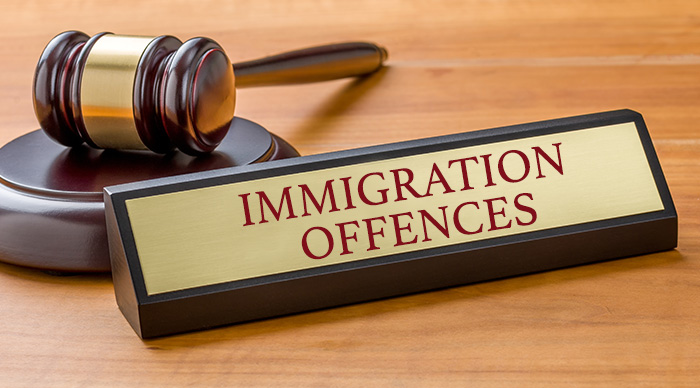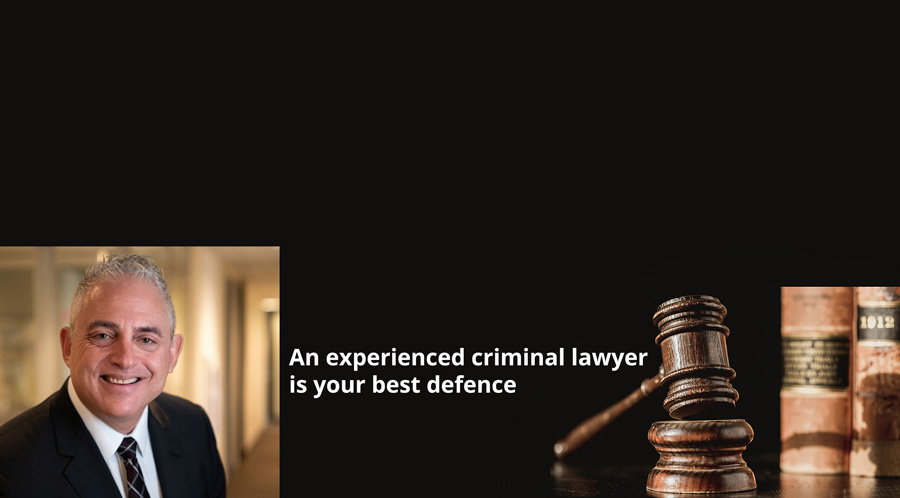Immigration offences
The Immigration and Refugee Protection Act (IRPA) governs who is allowed to come to or remain in Canada. For the purposes of this section, the law has two aspects to it. It details who is inadmissible on grounds of criminality, and later on in the law, it covers the various offences that are in violation of IRPA. It may be surprising to know that these offences apply to both foreigners as well as Canadian citizens.

What follows is a brief overview of these two aspects.
Inadmissibility on grounds of criminality classifies acts as either:
- Serious criminality
- Criminality
- Organized criminality
Having engaged in Serious criminality, a permanent resident or a foreign national is inadmissible to come to or remain in Canada.
Serious criminality includes:
- Having been convicted in Canada of either an offence punishable by ten years, or of an offence for which a term of imprisonment of more than six months has been imposed;
- Having been convicted of an offence outside Canada that, if committed in Canada, would be punishable by a maximum term of imprisonment of at least ten years; or,
- Committing an act outside Canada that is an offence in the place where it was committed and that, if committed in Canada, would constitute an offence punishable by a maximum term of imprisonment of at least ten years.
Engaging in Criminality covers lesser offences and applies only to foreign nationals. A foreign national is inadmissible on grounds of criminality for:
- Having been convicted in Canada of a serious offence, or of two less serious and separate offences;
- Having been convicted outside Canada of an offence that, if committed in Canada, would be considered a serious offence, or of two less serious and separate offences;
- Committing an act outside Canada that is an offence in the place where it was committed and that, if committed in Canada, would constitute a serious offence;
- Committing, on entering Canada, an offence to the Immigration and Refugee Protection Act.
And finally, engaging in Organized Criminality makes a permanent resident or a foreign national inadmissible if he is:
- A member of an organization that is believed to be or to have been engaged in organized criminal activity anywhere in the world;
- Engaging, in the context of transnational crime, in activities such as people smuggling, trafficking in persons or money laundering.
Penalties
Sections 117 and the sections that follow, set out numerous offences for those who break the Immigration and Refugee Protection Act.
Offences such as Organizing entry into Canada, Human Smuggling, and Trafficking in Persons, carry very severe penalties. These can be as serious as a $1,000,000 fine and / or life in prison.
What Steven Slimovitch Can Offer You
When you or someone you know has been charged with an immigration offence, it is important to retain the services of an experienced criminal defence lawyer as soon as possible. Steven Slimovitch is a highly skilled and experienced criminal defence lawyer with a very impressive track record in this area. He has defended countless people accused of immigration offences and has successfully supported them throughout the legal process and enabled them to get their lives back on track. He has also provided his opinion to numerous immigration lawyers as to which foreign crimes render individuals inadmissible.
Frequently Asked Questions
What should I do if I am accused of violating immigration laws?
Avoid making statements to immigration officers or authorities without consulting a lawyer. Certain offences may result in removal, inadmissibility, or serious consequences for your permanent resident status or refugee protection application.
An immigration and refugee lawyer can help you understand your rights, analyze the allegations, and prepare an appropriate defence.
What are the most common types of immigration offences?
Common immigration offences in Canada include:
- Presenting false documents,
- working or studying without authorization,
- overstaying a visa,
- entering Canada illegally,
- or fraudulent sponsorship.
Some of these offences may be considered serious, particularly if they are committed in Canada or outside Canada under specific circumstances.
These acts may result in criminal or administrative proceedings under the Immigration and Refugee Protection Act (IRPA).
What are the penalties for immigration offences?
Penalties may include:
- Fines,
- deportation (known as a removal order),
- inadmissibility (temporary or permanent),
- or even imprisonment in the most serious cases.
A person convicted in Canada of an offence against a federal law punishable by imprisonment for ten years or more may be considered inadmissible on grounds of serious criminality.
Why might I be declared inadmissible to Canada?
An individual may be declared inadmissible to Canada for several reasons, including:
- Criminal history,
- risks to Canada’s security,
- involvement in human rights or international violations,
- public health or financial security issues,
- or providing false information on an application.
Even an unintentional error or omission can lead to a prohibition, depending on whether the officer has reasonable grounds to believe that an offence has been committed.
Can I appeal a decision to refuse entry?
Yes. Some decisions can be appealed to the Immigration Appeal Division (IAD) or be subject to judicial review in the Federal Court of Canada.
The deadlines are short—it is essential to consult an immigration and citizenship lawyer as soon as possible.
What is a serious offence under immigration law?
A serious offence is generally an offence punishable by imprisonment for at least ten years, whether in Canada or abroad. This may include certain financial, fraud, or violent crimes.
Under the IRPA, such an offence automatically renders the person inadmissible to Canada, with no possibility of appeal in some cases.
How can a lawyer help me with this type of case?
An experienced immigration, refugee, and citizenship Canada (IRCC) lawyer can:
- Assess the validity of the allegations,
- challenge the evidence presented by Canadian border services,
- identify remedies such as deferral of removal and
- represent the person before the Immigration and Refugee Board, including the Refugee Protection Division.
They will also ensure that your rights are fully respected at every stage of the process.
Can I contact you at any time if I am arrested or charged with a crime?
Yes. Steven Slimovitch is available 24/7 for urgent criminal matters. If you are arrested or charged, you can call at any time to receive immediate legal assistance. Acting quickly can be critical to protecting your rights.
Will you represent me immediately if I contact you after an arrest?
Absolutely. Steven Slimovitch can act on your behalf right away. Having a lawyer present from the earliest stage helps ensure that your rights are respected and can significantly impact the outcome of your case.
Do I need to meet you in person to start working with you?
Not necessarily. In urgent cases, initial consultations can often be done over the phone or by videoconference. Steven Slimovitch will work with you to find the fastest, most efficient way to begin your defence.
How quickly can you start working on my case?
Immediately. Upon your first contact, Steven Slimovitch will start assessing your situation and advising you on the next steps to take. Early intervention often makes a major difference in criminal matters.
Do you handle cases outside of Montreal?
Yes. Although based in Montreal, Steven Slimovitch regularly represents clients across Quebec and can discuss handling cases elsewhere depending on the circumstances.
LEGAL FEES
Steven Slimovitch offers a free initial consultation in order to properly assess your particular situation and circumstance.
Legal fees are determined either on a per-hour billing rate or a flat fee basis. We will always provide you with an accurate estimate of the potential financial costs associated with your file.


